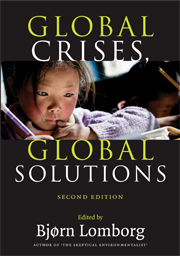
-
Select format
-
- Publisher:
- Cambridge University Press
- Publication date:
- 05 June 2012
- 09 July 2009
- ISBN:
- 9780511807633
- 9780521517218
- 9780521741224
- Dimensions:
- (247 x 174 mm)
- Weight & Pages:
- 1.32kg, 710 Pages
- Dimensions:
- (247 x 174 mm)
- Weight & Pages:
- 1.36kg, 710 Pages
You may already have access via personal or institutional login
Book description
The first edition of Global Crises, Global Solutions was nominated as one of the books of the year by The Economist in 2004. This second edition asks: if we had more money to spend to help the world's poorest people, where could we spend it most effectively? Using a common framework of cost-benefit analysis a team of leading economists, including five Nobel prize winners, assess the attractiveness of a wide range of policy options for combating ten of the world's biggest problems: Air pollution, Conflicts, Diseases, Education, Global Warming, Malnutrition and Hunger, Sanitation and Clean Water, Subsidies and Trade Barriers, Terrorism, Women and Development. The arguments are clearly presented and fully referenced so that readers are encouraged to make their own evaluation of the menu of policy options on offer. Whether you agree or disagree with the economists' conclusions, there is a wealth of data and ideas to discuss and debate.
Reviews
'… an instructive guide … a remarkable book which provides essential data for any informed discussion of vital world problems … so often dominated by ill-informed debate. This book should prove necessary reading for all policy makers and philanthropists concerned with seriously tackling the world's challenges.'
Nicholas Newman Source: www.oxfordprospect.co.uk
Contents
Metrics
Altmetric attention score
Full text views
Full text views help Loading metrics...
Loading metrics...
* Views captured on Cambridge Core between #date#. This data will be updated every 24 hours.
Usage data cannot currently be displayed.
Accessibility standard: Unknown
Why this information is here
This section outlines the accessibility features of this content - including support for screen readers, full keyboard navigation and high-contrast display options. This may not be relevant for you.
Accessibility Information
Accessibility compliance for the PDF of this book is currently unknown and may be updated in the future.


